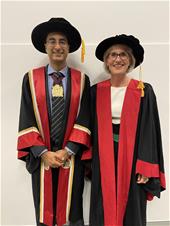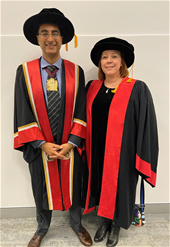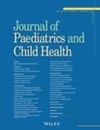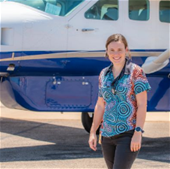Pot-pourri eBulletin - 17 June 2024

RACP Congress was recently held in Sydney and it was a wonderful opportunity to meet with our physician colleagues, especially those who may not share our paediatric craft but remain dedicated to excellence in health care. A particular highlight was hearing Professor Alistair Gunn present the annual Howard Williams Medal Oration. Although unfortunately not able to attend in person due to illness, Alistair showed great spirit and commitment by not just pre-recording his presentation but participating on the day in a FaceTimed Q&A session applauded by an enthusiastic in-person audience. Thank you, Alistair, for being so gracious, and for your entertaining and fascinating presentation.
While at Congress I was pleased to be a judge for the Paediatric Best Poster Prize which this year was won by Dr Taylor Pennell (Trainee recipient) and Professor Elizabeth Elliott (Fellow recipient). You can read more about their presentations here. While we were very impressed by the poster presentations, submissions for the Prize were lower than usual and it was a little disappointing to see so few entrants overall. We’ll be doing some work ahead of next year to see how we can better promote this excellent opportunity to showcase members’ work. I’d like to thank my fellow judges on the day, Dr Jenny Proimos and Dr Hamish McCay, and express my congratulations to the winners and all who contributed.
Congress 2024 also gave me the opportunity to meet with Dr Camilla Kingdon, Immediate Past President of the Royal College of Paediatrics and Child Health (London), who was an invited speaker to Congress contributing to the Women in Medical Leadership panel and the closing Physician of the Future session.

While on the subject of women in medical leadership, it was also my pleasure to meet Dr Emily Horsley, a paediatrician who has been awarded RACP Mentor of the Year.

In my capacity as a National Examiner, I attended the National Examination Panel Workshop and Calibration Day held in Sydney on Wednesday, 15 May. By the time this message is published, the Paediatrics Divisional Clinical Exams will have finished and the results published. I would like to acknowledge all candidates who sat, knowing how hard they have worked towards this goal, and to congratulate those who were successful in achieving this long-awaited milestone.
Finally, I wish to congratulate Dr Hamish McCay and Dr Aidan Tan as new RACP Board members, Hamish as President Aotearoa New Zealand, and Aidan as Trainee Director. I know the Board and the College as a whole will benefit from their dedication, energy, and wisdom.
Professor Nitin Kapur
PCHD President
Please keep an eye on the EOIs page on the College website for vacant positions on PCHD Committees.
All Expressions of Interest
2024 King's Birthday Honours list
Congratulations to the 22 RACP Fellows recognised in the 2024 King's Birthday Honours list. These awards highlight the outstanding work RACP members do and the importance of that work in local, national and international communities.
Aotearoa New Zealand
Officer of the New Zealand Order of Merit (ONZM)
Associate Professor Rohan Valentine Ameratunga FRACP
For services to immunology.
Professor Phillippa Poole FRACP
For services to medical education.
Australia
Officer of the Order of Australia (AO) in the General Division
Professor Jo Anne Douglass FRACP
For distinguished service to medical research, to clinical immunology and allergy, to respiratory medicine, and to tertiary education.
Member of the Order of Australia (AM) in the General Division
Clinical Associate Professor John Stanley Cullen FRACP
For significant service to geriatric medicine as a clinician, researcher, health innovator and advocate.
Professor Katina D'Onise FAFPHM
For significant service to public health through translational research, and policy and legislative reform.
Dr Kathleen Margaret Eagar FAFRM (Hon)
For significant service to community through health services research and development, and as a mentor.
Dr Eileen Gallery, Roseville FRACP
For significant service to nephrology, to obstetric medicine, and to tertiary education.
Professor Sharon Ruth Goldfeld FAFPHM, FRACP
For significant service to paediatric medicine as a clinician and academic, and to public health research.
Associate Professor Christine Jeffries FRACP
For significant service as a paediatrician, to rural and remote medicine, and to the Indigenous community.
Conjoint Professor Tracey Anne O'Brien FRACP
For significant service to cancer medicine, to medical research and education, and to professional bodies.
Emeritus Professor Michael Paul Pender
For significant service to medicine, particularly neurology and multiple sclerosis research, and to tertiary education.
Professor Helen Kathryn Reddel FRACP
For significant service to respiratory medicine, and to medical research.
Clinical Associate Professor Christine Philippa Rodda FRACP
For significant service to paediatric endocrinology, to medical research, and to tertiary education.
Professor David McRae Russell FRACP
For significant service to general medicine, to clinical education, and as a mentor.
Professor Gregory Michael Scalia FRACP
For significant service to cardiology as a clinician, academic and mentor.
Medal of the Order of Australia (OAM) in the General Division
Professor Asha Clare Bowen FRACP
For service to medicine in the field of clinical disease.
Dr John Edward Gault FRACP
For service to the community of Bendigo.
Professor Anne Marie Kavanagh FAFPHM
For service to medicine, particularly disability health research.
The late Professor Emeritus William John Louis FRACP
For service to medicine as a clinical pharmacologist.
Dr Lynette Therese Masters FRACP
For service to medicine as a neuroradiologist.
Dr David Speers FRACP
For service to medicine as a microbiologist.
Awarded the Public Service Medal (PSM)
Dr Stephanie Davis FAFPHM
For outstanding public service through sustained leadership in supporting Australia’s primary health care system throughout and beyond the COVID-19 pandemic.
Associate Professor Elisabeth Murphy FAFPHM
For outstanding public service to child and family health programs in NSW.
The Vera Scantlebury Brown Child Welfare Memorial Trust Scholarship
Each year, The Vera Scantlebury Brown Child Welfare Memorial Trust Scholarship is awarded to successful applicants by the Department of Paediatrics, University of Melbourne.
The scholarship supports the professional development of women working in the areas of maternal and child health, early childhood education, prenatal, child and family health, development, and wellbeing.
Women who work in these areas are encouraged to apply.
Applications open on Monday, 3 June 2024 until Friday, 9 August 2024.
Enquiries: paeds-general-enquiries@unimelb.edu.au
More Information: https://medicine.unimelb.edu.au/school-structure/paediatrics/study/professional-development/the-vera-scantlebury-brown-child
Babyscreen+ research study: Genomic Newborn Screening
Share your knowledge and expertise through 30-minute interviews to help shape the future of genomic newborn screening.
The BabyScreen+ study is investigating the best way to deliver a genomic newborn screening program.
We want to understand the acceptability of models of genomic newborn screening amongst health professionals whose clinical practice may be impacted by the results of this screening.
We would like to invite paediatricians, specialists, and general practitioners to take part in a 30-minute interview by phone or videoconference.
To participate in an interview, please email Nathasha at: babyscreen@mcri.edu.au. Nathasha will organise a time for the interview.
This study has received ethical approval from the Royal Children’s Hospital Human Research Ethics Committee (HREC Project Number: 91500).
Call for interest: Shaping the Future of Paediatric Palliative Care

Palliative Care Australia and Paediatric Palliative Care Australia and New Zealand (PaPCANZ) are embarking on the "Shaping the Future of Paediatric Palliative Care" project, a transformative initiative aimed at improving the lives of infants, children, and young people facing life-limiting conditions. They are eager to establish connections with specialist physicians, particularly neurologists, cardiologists, and oncologists, as their expertise significantly intersects with the care of infants, children, and young people facing life-limiting conditions. Activities will include:
WORKSHOPS: The purpose of the workshop is to discuss referral-related questions and find feasible solutions. This format will be a single gathering of up to seven healthcare professionals on a MS Teams online call for 1to1.5 hours (commencing at the end of June – beginning of July 2024).
WRITING GROUP: Working groups will develop what has been discussed in the workshops. They are scheduled for one hour each, with a total of five working groups (approximately commencing July/August 2024).
Please scan the QR code to express your interest or visit the following link: https://forms.office.com/r/WfxxBu4gKG.
The RACP Member Wellbeing Framework – now available

As doctors, your career is all about improving the health of others — but sometimes this can come at the cost of looking after your own. While you may be less likely to suffer from lifestyle-related illnesses, reports have shown that you are more vulnerable to mental health and wellbeing issues compared to the general population.
The RACP’s previous work on the Health of Doctors identified that one reason you may struggle with self-care is due to your natural tendency to prioritise others before yourself. This risk can lead to negative impacts on your own health, which can in turn affect patient care and their families.
To raise awareness about the importance of prioritising your health and wellbeing while supporting your professional journey, the College’s Member Health and Wellbeing Committee developed the RACP Member Wellbeing Framework. The Framework sets out overarching domains of wellbeing, provides links to relevant resources for each domain and includes a link to an evidence-based self-assessment tool, plus so much more.
Read the Framework or find out more.
Take the new Fellow survey
.jpg?sfvrsn=1dc4dd1a_1)
Did you complete an RACP Advanced, Faculty or Chapter training program between 1 April 2022 and 31 May 2023? Then you are invited to complete this year’s New Fellow Survey to share your experience as an early career physician.
The 15-minute anonymous online survey will ask respondents how their RACP training program has prepared them for Fellowship. Feedback will help us provide tailored resources and support for members and make evidence-informed improvements to our training programs.
The survey is open until Sunday, 14 July 2024 at 11.59pm AEST.
For more information about the anonymous 15-minute survey, including confidentiality and how the data will be reported, please visit the New Fellow Survey page on the RACP website.
Thank you to those Fellows who have already participated in this year’s New Fellow Survey.
Find out more and take the survey here.
Journal of Paediatrics and Child Health

The Journal of Paediatrics and Child Health publishes original research articles of scientific excellence in paediatrics and child health. The latest edition is now live and available to view online.
Articles in this edition include:
- RACP Trainee Research Awards in paediatric medicine presentations 2022 and 2023
- Gerry Murphy prize presentations
- Paediatrics and Child Health poster presentations
Read the journal
Changes to Qld Medicines and Poisons Legislation
Effective 1 May 2024, new amendments to the Queensland Government's Medicines and Poisons legislation will enhance access to certain medicines for Queenslanders. Her Excellency the Governor, with the advice of the Executive Council, approved the Medicines and Poisons (Medicines) Amendment Regulation 2024.
Key updates include:
For Registered Nurses (EPA-RN):
- COVID-19 vaccine: Removal of the mandatory COVID-19 vaccination training requirement.
- Expanded vaccine list: Inclusion of Cholera, Rabies (pre-exposure), Typhoid, and RSV immunisation.
- Administration locations: Registered nurses can now administer vaccines in more locations, including aged care facilities, general practices, community pharmacies, relevant health service facilities, and approved immunisation program facilities.
- Hormonal Intrauterine Devices: Addition of devices like Mirena® and Kyleena® to EPA-RN Part C.
- Educational requirements: Employers can approve rural and isolated practice area programs of study for RNs under EPA-RN Part B. A supporting factsheet is available.
For Midwives (EPA-Midwives):
- COVID-19 vaccine: Removal of the mandatory COVID-19 vaccination training requirement.
- Expanded vaccine list: Inclusion of RSV immunisation and remaining National Immunisation Program Vaccines.
- Family immunisations: Midwives can now administer immunisations to the entire family unit.
- Hormonal Intrauterine Devices: Addition of devices like Mirena® and Kyleena®.
For more information, please contact Mrs Una Schumacher, Director of Nursing, Office of the Chief Nurse Officer, at 07 3328 9678 or OCNMO_ProfessionalCapability@health.qld.gov.au.

Australia is a big and sparsely populated continent. Twenty-eight percent of Australians live in areas classified regional, rural or remote and their access to health services is much more limited. It’s estimated that between 2009 and 2011 there were 19,000 excess deaths in regional and remote areas as compared to the major cities. No doubt, socioeconomic disadvantage is a factor in that mortality gap, but inequitable access to healthcare is also a major driver. In this podcast we focus specifically on the shortage in health practitioners in the regions.
Even in regional centres, the density of physicians by population count is two thirds what it is in the major cities. By the time you get to large rural towns it’s just over a third that baseline. In this podcast we discuss opportunities to lift recruitment and retention. This means improving the experience for trainees and the esteem for rural medicine in the eyes of the profession at large.
Guests
Adjunct Professor Graeme Maguire PhD FRACP MHM MPHTM (President Adult Medicine Division, RACP and Director of Medical Education, WA Country Health Service).
Dr Sarah Straw FRACP (WACHS Kimberley Regional Physician Team; Northern Hospital, Melbourne; Rural, Regional and Remote Working Group, RACP).
Associate Professor Matthew McGrail PhD (Head Regional Training Hub Research, University of Queensland).
Please visit the Pomegranate Health web-page for a transcript and supporting references. Login to MyCPD to record listening and reading as a prefilled learning activity. Subscribe to new episode email alerts or search for ‘Pomegranate Health’ in Apple Podcasts, Spotify, Castbox or any podcasting app.
https://www.racp.edu.au/pomegranate/view/ep109-cultivating-a-rural-workforce
College Learning Series: Tell us your favourite lecture and why
.jpg?sfvrsn=34dadd1a_1)
The RACP is seeking your feedback on gaps and opportunities for improvement in the College Learning Series (CLS).
We also need your help to identify exemplar lectures. Tell us which CLS lecture/s you liked and why.
Your feedback will help future presenters deliver high quality, engaging lectures that meet your needs and expectations.
Did you know that you can now update your address details online? Simply Login to MyRACP and go to “Edit my details”.

Mentor Match is designed to support your professional development needs. It’s an innovative, online tool that facilitates the establishment of mentoring relationships. It is user-driven, allowing registered Mentees to search among registered Mentors using specified criteria to find individuals whose experience and expertise match areas in which they wish to be mentored. Likewise, registered Mentors can search for and identify potential Mentees. Mentor Match is a benefit of membership and is available only to members via the RACP Online Community (ROC).
Log in to the ROC and find out more
RACP Benefits - your new lifestyle benefits program has arrived

Save on all your favourite lifestyle and service brands from leading retailers across Australia and Aotearoa New Zealand – with
RACP Benefits. Our new lifestyle benefits portal offers you exclusive discounts and genuine savings on items in a range of popular categories. To celebrate the launch of
RACP Benefits, we have some great offers for you to explore.
So log in today and take advantage of your RACP Benefits.
Pomegranate Health podcast: Your contributions welcome
The RACP podcast, Pomegranate Health, has published over 100 episodes since starting out eight years ago.
To provide more frequent and focused content we’re seeking contributions from our speciality societies, committees and affiliated professional organisations.
To hear what this would sound like, listen to the episodes tagged [IMJ On-Air]
These episodes feature authors published in the Internal Medicine Journal being interviewed by the relevant section editor.
They have covered themes as varied as asthma management, hospital-acquired complications, causes of readmission and the JEV outbreak.
You already spend considerable time preparing lectures and webinars for your colleagues.
Audio podcasts provide an easy way to reach thousands more around the world.
Each episode gets downloaded around 6500 times over the first 12 months from publication, with 21 per cent of listeners located outside of Australia and Aotearoa New Zealand.
All you need to do is to organise one or more presenters and an interviewer familiar with the material. The podcast producer will coordinate an online recording lasting about one hour and then edit it down before publication. The intention would be to ‘brand’ regular episodes from your specialty society or organisation in the same way that we’ve done with [IMJ On-Air].
Please send any questions or ideas to podcast@racp.edu.au
View all career opportunities on the RACP website.
To submit an article for publishing in Pot-pourri, please email paed@racp.edu.au. The article should be no more than 350 words. If you would like to submit an image with your article, it would be assumed that you have received appropriate permission to use the photo and it needs to be of high resolution, above 300 dpi. Please note that articles may need to be edited by the RACP Communications Team.